|
Eid-al-Adha:
The ritual and the rejoicing
by Husna Inayathullah
 Eid-al-Adha or Haj Festival as it is popularly known, is considered
the Festival of the Sacrifice. It is also known as the Greater Eid, Eid
e Qurban and is the second most significant religious holiday in the
Islamic calendar, celebrated with great spirituality by Muslims all over
the world. Eid-al-Adha or Haj Festival as it is popularly known, is considered
the Festival of the Sacrifice. It is also known as the Greater Eid, Eid
e Qurban and is the second most significant religious holiday in the
Islamic calendar, celebrated with great spirituality by Muslims all over
the world.
Haj, the annual pilgrimage to Mecca, is one of the five pillars of
Islam and is hence a once in a lifetime obligation for Muslims who are
physically and financially able.
In what is said to be the largest gathering of any single group in
one place and a remarkable spiritual congregation, more than two million
Muslims from every corner of the globe go to Mecca each year to perform,
Haj, the rites of which include circling the Ka’aba seven times and
going seven times between the hillocks of Safa and Marwa, as Hajra did
during her search for water. In performing the Haj, a pilgrim follows
the order of ritual that the Prophet Muhammad performed during his last
pilgrimage.
Following this, the pilgrims stand together in Arafa and ask God for
His forgiveness, in what is often thought of as a preview of the Day of
Judgment.
The end of the Haj is marked by Eid al-Adha on the 10th day of the
month of Dhul Hijjah, which is the last month of the Islamic lunar
calendar. Muslims in Sri Lanka will be celebrating Eid on September 24,
2015 according to the Colombo Grand Mosque.
Significant events
Two significant Islamic events took place in the history of Islam
which represents Haj. They are the culmination of the Haj pilgrimage to
Mecca and the sacrifice that Allah commanded Prophet Ibrahim of his
beloved son, Ismail.
Allah had made the Haj mandatory upon mankind initially during the
time of Prophet Ibrahim. The spread of idolatry across Saudi Arabia
caused the rituals of Haj to become extremely distorted. Allah described
the correct manner in which it was to be performed in the Holy Quran.
There are several rituals which constitutes the framework of Haj.
These include performing Tawaf, which means circulating the Ka’aba seven
times, Sa’i, which means walking between the mounds of Safa and Marwa
seven times, supplicating to Allah at Arafat, the place where Prophet
Muhammad gave his farewell speech, proclaiming the final seal of Islam
where Muslims believe they will be resurrected on the Day of Judgment
and stoning the pillars that symbolise Satan at Mina, the place where
Satan repeatedly challenged Ibrahim to disobey Allah’s command to
sacrifice his son.
Each of these rituals is a step in the pilgrim’s difficult journey
towards spiritual cleansing. It is said a pilgrim’s prior sins will be
forgiven when he or she executes these acts in a prescribed manner.
The final ritual the pilgrims must perform is the sacrifice of a
domestic animal. It signifies the completion of these acts and is known
as Qurban. In addition to denoting the completion of Haj, Eid-al-Adha
honours the monumental sacrifice that was to be made by Prophet Ibrahim,
who was ordered by Allah to sacrifice his beloved son Ismail as a test
of obedience.
Eid-al-Adha exemplifies the charitable instincts of Muslims and
embodies the values of discipline, self-denial and submitting to the
will of Allah.
It is a joyous occasion marked with family traditions and
celebrations.
During the festival of Eid al-Adha and the days preceding it, Muslims
recite the Takbir. This is particularly the case on the Day of Arafat.
The Takbir is the term for the Arabic phrase ‘Allahu Akbar’ translated
as ‘God is the greatest’.
Eid-al-Adha is a time of remembrance of the trials of Prophet Ibrahim,
a time to celebrate the end of Haj, and a time that men, women, and
children of all ages greatly look forward.
Eid-al-Adha means…
We asked a cross section of Muslims what the Eid
–al- Adha means to them
| A celebration of sacrifice
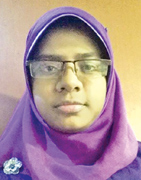 Farwin
Rahuman - Haj for me is a celebration of sacrifice, devotion
and equality. This festival brings into our minds a few of
the greatest individuals in Islam - Prophet Ibrahim, his son
prophet Ismail and his mother Hajra. It is during this
festival that thousands of Muslims visit the holy city of
Mecca to perform Haj as one whole Muslim umma. This festival
reminds me of the devotion that prophet Ibrahim and Ismail
had towards Allah and also the undying faith lady Hajra had
in our creator. While the pilgrims in Mecca clad in the same
attire gathered for one single purpose reminds us of the
unity we share irrespective of all our differences. Farwin
Rahuman - Haj for me is a celebration of sacrifice, devotion
and equality. This festival brings into our minds a few of
the greatest individuals in Islam - Prophet Ibrahim, his son
prophet Ismail and his mother Hajra. It is during this
festival that thousands of Muslims visit the holy city of
Mecca to perform Haj as one whole Muslim umma. This festival
reminds me of the devotion that prophet Ibrahim and Ismail
had towards Allah and also the undying faith lady Hajra had
in our creator. While the pilgrims in Mecca clad in the same
attire gathered for one single purpose reminds us of the
unity we share irrespective of all our differences. |
| We learn many good lessons
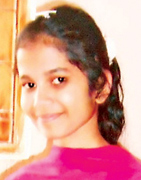 Nujla
Inayathullah - This festival is celebrated to honour the
sacrifice which was to be made by Prophet Ibrahim. The
special act on this day is giving Qurban. We learn many good
lessons from this festival. Even though it is a festival of
sacrifice, we all spend this day with happiness with the
rahmat of Allah the Almighty. There is no difference between
rich and poor, every one of us celebrate this day wearing
new clothes. Reciting ‘Takbir’ on this day is highly
beneficial, in order to praise Allah. I am looking forward
to celebrate Haj. Nujla
Inayathullah - This festival is celebrated to honour the
sacrifice which was to be made by Prophet Ibrahim. The
special act on this day is giving Qurban. We learn many good
lessons from this festival. Even though it is a festival of
sacrifice, we all spend this day with happiness with the
rahmat of Allah the Almighty. There is no difference between
rich and poor, every one of us celebrate this day wearing
new clothes. Reciting ‘Takbir’ on this day is highly
beneficial, in order to praise Allah. I am looking forward
to celebrate Haj. |
| A time of happiness for all Muslims
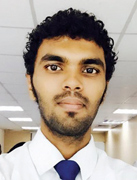 Shafkhan
Munzir - Muslims celebrate this festival to earn the
blessings of Allah and seek forgiveness. On the day of Eid,
I go to the mosque to listen to the sermon early in the
morning and then offer Eid prayers, come back home and have
breakfast with the family and then visit our relatives. We
are encouraged to wear our best clothes and also distribute
gifts to family, friends and neighbours with love. This is
one of the most important festival of Islam and a time of
happiness for all the Muslims around the world. Shafkhan
Munzir - Muslims celebrate this festival to earn the
blessings of Allah and seek forgiveness. On the day of Eid,
I go to the mosque to listen to the sermon early in the
morning and then offer Eid prayers, come back home and have
breakfast with the family and then visit our relatives. We
are encouraged to wear our best clothes and also distribute
gifts to family, friends and neighbours with love. This is
one of the most important festival of Islam and a time of
happiness for all the Muslims around the world. |
| Journey to the heart of Islam
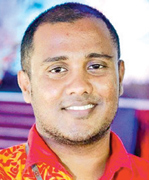 Nifraz
Rifaz - Haj means a journey to the heart of Islam. One of
the five pillars of Islam central to Muslim belief, Haj is
the pilgrimage to Mecca that every Muslim must make at least
once in his lifetime if he is able. People pour into Mecca
by land, sea, and air, while there is no force, allurement,
propaganda, or any other urging factors. This reminds me f
peace and equality. Although I will not perform Haj in Mecca
this time I will use this time to connect with my friends,
neighbours, and family. Nifraz
Rifaz - Haj means a journey to the heart of Islam. One of
the five pillars of Islam central to Muslim belief, Haj is
the pilgrimage to Mecca that every Muslim must make at least
once in his lifetime if he is able. People pour into Mecca
by land, sea, and air, while there is no force, allurement,
propaganda, or any other urging factors. This reminds me f
peace and equality. Although I will not perform Haj in Mecca
this time I will use this time to connect with my friends,
neighbours, and family. |
| Special for me
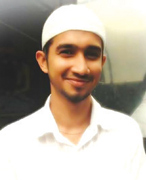 Mohamed
Aashif - Haj festival always remind me of sacrificing. I am
so happy that my uncle is performing Haj for the first time
this year. I am also waiting eagerly to eat the watalappan
my mother prepares. Getting dressed and going for prayers is
really exciting. This year Haj festival is going to be
special for me as for the last two years I was not with my
family. I like to perform Haj one day and this is a dream
that every Muslim has. Mohamed
Aashif - Haj festival always remind me of sacrificing. I am
so happy that my uncle is performing Haj for the first time
this year. I am also waiting eagerly to eat the watalappan
my mother prepares. Getting dressed and going for prayers is
really exciting. This year Haj festival is going to be
special for me as for the last two years I was not with my
family. I like to perform Haj one day and this is a dream
that every Muslim has. |
| A moment of sharing
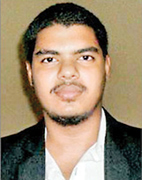 Thanzyl
Al-Thajudeen - Haj is when every able-bodied Muslim who are
blessed with enough money makes his or her journey at least
once in their lifetime on a pilgrimage to Mecca, the holy
city of Islam where Prophet Muhammad was born and is the
‘mother of all settlements’ [Quran (6:92, 42:5)]. Every year
more than one and half billion Muslims across the world
celebrate this Holy day as a moment of sharing their
spiritual togetherness, responsibility, and devotion. I am
eager to celebrate the Haj festival this time with my small
family. Thanzyl
Al-Thajudeen - Haj is when every able-bodied Muslim who are
blessed with enough money makes his or her journey at least
once in their lifetime on a pilgrimage to Mecca, the holy
city of Islam where Prophet Muhammad was born and is the
‘mother of all settlements’ [Quran (6:92, 42:5)]. Every year
more than one and half billion Muslims across the world
celebrate this Holy day as a moment of sharing their
spiritual togetherness, responsibility, and devotion. I am
eager to celebrate the Haj festival this time with my small
family. |
Quotas and agents
|

Minister of Muslim
Religious Affairs,
Abdul Haleem |
Though the Haj pilgrimage is obligatory on
all Muslims who are physically and financially able to do
so, the quest to transform Mecca into some kind of
construction wonder has meant that each country is subjected
to a quota system, limiting the number of pilgrims from each
country.
The quota for Sri Lanka this year was
2240. However, Minister of Muslim Religious Affairs, Abdul
Haleem claims that due to the high demand a further 600 more
pilgrims were added to the quota, and takes credit to
securing the increase. Altogether 2840 pilgrims from Sri
Lanka have left for Mecca this year.
Haj travel from Sri Lanka is a
travel-agent-controlled affair from start to finish, with
the agents determining the eligibility of the pilgrims. “The
agents charge a huge amount from the pilgrims,” Haleem
alleges.
The agents make the pilgrimage a complete
package that includes accommodation, food and medical care.
Often a cook and a doctor are included among the pilgrims.
This time the Haleem’s ministry is sending two doctors to
look after the pilgrims and he says there are also Sri
Lankan volunteers in Saudi Arabia to look into their safety
and security.
Making the pilgrimage is a costly affair
for Sri Lankan Muslims, with the packages for the nearly
month long visit, ranging from Rs 450,000 to 650,000 and
above. Haleem accuses the agents of overcharging and says if
the Ministry of Muslim Religious Affairs is able to control
the Haj, the cost could be reduced significantly. “Maybe
next year I will be able to put my plans into practice and
then I will give the opportunity for at least 500 poor
Muslims to perform Haj,” he promises. |
|

